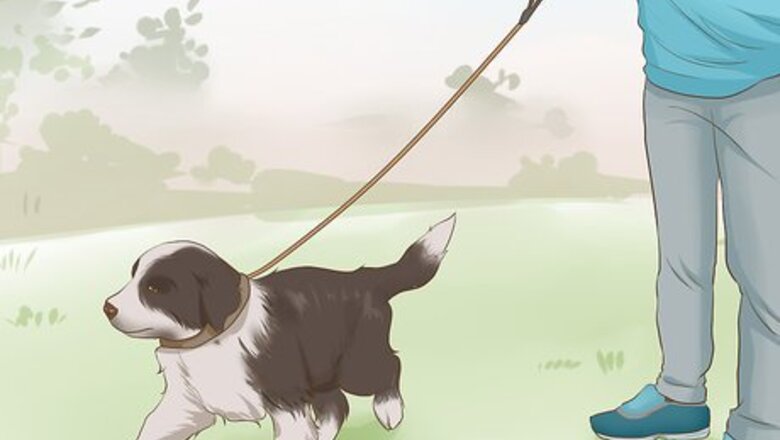
views
Your Border Collie puppy responds well to training, so they can easily learn new games to play with you. Whether you exercise them indoors or outdoors, make sure your puppy gets the opportunity to play and exercise every day.[1]
X
Research source
Exercising Your Puppy Safely
Understand the risks of overexercising your puppy. Many dog owners are tempted to push their puppy too far too fast. Having a new puppy is fun and exciting, so you'll want to spend lots of time walking it and playing games. However, your puppy isn't ready for a lot of exercise, and giving it too much could harm its joints in the long run. This could eventually cause arthritis. Fortunately, you can avoid this issue by setting limits for your puppy. Exercise for a shorter amount of time. Limit what activities your puppy engages in to light exercise. Focus more on cuddling your pup than on exercising it. If you take your dog for runs all the time, they'll become dependent on that type of excitement.
Follow the "5 minute rule" to set time limits for exercise. It's easy to over-exercise a puppy, which can harm the dog over time. To determine how often you should exercise your puppy, multiply the number of months old your puppy is by 5 minutes. This is called the "5 minute rule." Keep your puppy's exercise session under this time limit. For example, a 4-month-old puppy should not exercise more than 20 minutes.
Avoid activities that stress your dog's joints. Your puppy should not be jumping off walls or doing agility training, as this can damage your pup's joints. Dogs should not participate in agility training until they are at least 12-months-old. Choose an easier exercise like taking a walk, playing fetch, or jogging with your puppy.
Exercising Outdoors
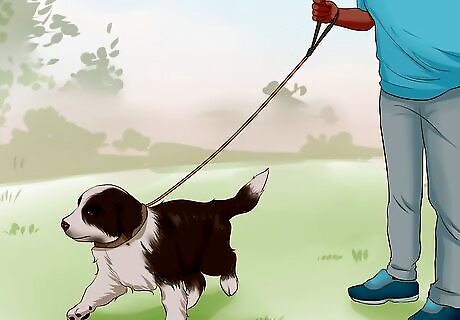
Take your puppy to the dog park. Dog parks are also a great way to socialize your new Border Collie. Take your puppy to your local dog park and let them have the opportunity to interact with other dogs and to run freely. Keep a close eye on your dog while you’re at the park to make sure they are interacting positively with other dogs and are in your sight at all times. Do not take your puppy out in public before they’ve received all of their vaccinations. They should not interact with other dogs before they’re fully vaccinated.
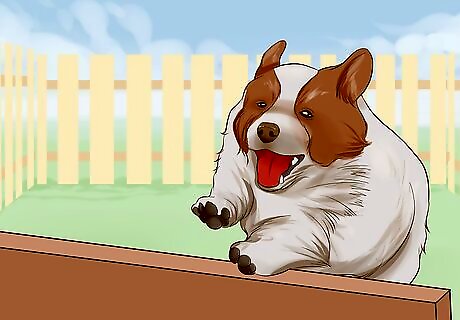
Exercise in a fenced-in yard. Border Collie puppies have a tendency to compulsively stalk and chase anything that moves. That might be a passerby, a squirrel, a kid, or a bird. They can roam free in a fenced-in yard, but should still be under your supervision. Large fenced-in yards are great areas to play games like fetch with your Border Collie puppy. Many Border Collies enjoy fetch or playing with Frisbees, and these are great ways to burn off some of your puppy’s energy. Make sure your fence is very secure. Border Collie puppies can be escape artists and have been known to dig under fences or virtually pick locks to get out. Keep your puppy on a leash and harness while you let them explore.
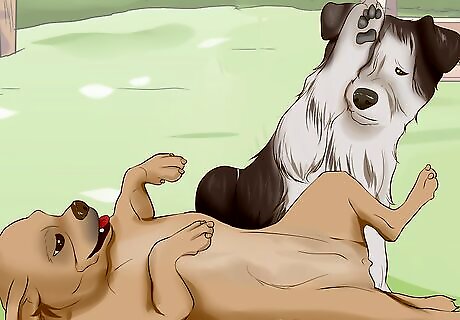
Make a puppy play date. Set up a puppy play date with a friend or family member that has also has a dog. If the two dogs haven’t met yet, give them some time to become familiar with each other before allowing them to play. You can either let them play outside in a fenced-in area, or inside. Socialization is an important aspect of a young puppy’s development, and playing with other dogs in a safe and controlled environment will encourage positive and healthy behavioral traits. Like with the dog park, your puppy should be fully vaccinated before they are allowed to interact with other dogs.
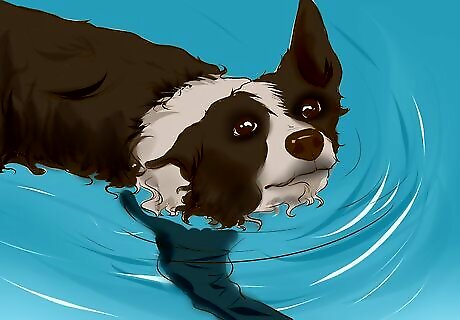
Take them swimming. Swimming is a great aerobic exercise for your puppy, and many Border Collies enjoy the water. You can take your puppy to a dog-friendly area, like a beach or pond, and let them swim. Make sure to follow any guidelines and rules that area has and keep a close eye on your puppy. Some dogs are naturally strong swimmers, but you may need to teach them how to swim. You can bring a buoyant plastic toy, like a retrieval toy designed for use in water or a Frisbee, to toss into the water for your puppy to retrieve. While most Border Collies are adept swimmers, you can purchase a doggie life vest to help your puppy float while they swim.
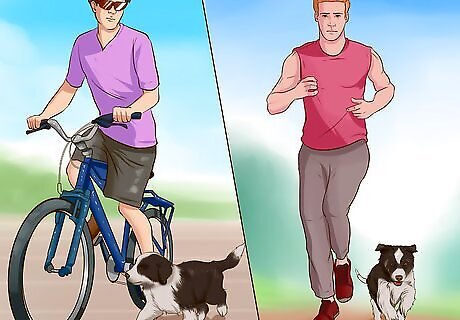
Walk, run, and bike with your puppy. You may have gotten a Border Collie puppy with the intention of having a training and exercise partner. You can start to train your new puppy to exercise with you early on, so they can become lifelong training partners. Whether you walk, run, or bike you can take your puppy along with you. Gradually increase the duration or distance of your exercise routine over time, keeping a close eye out to make sure your puppy isn’t being overexerted. A good rule of thumb is to increase your workout five minutes each month as your puppy ages. You’ll need to leash train your Border Collie puppy before you begin running or biking with them, but they learn quickly. With their natural energy levels, your Border Collie puppy can challenge and push you to beat your training records! Puppies can become overexerted, so keep a close eye on them and take breaks when they need one.
Exercising Indoors
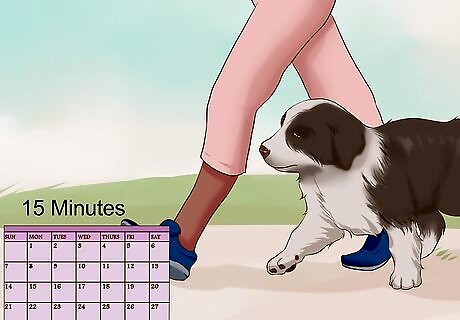
Exercise daily. Border Collie puppies are very active and have a lot of energy. As a breed, they were originally bred to be working dogs so they have a strong drive to follow directions and to work. While it is ideal to exercise your puppy outdoors, you may have to exercise them indoors during inclement weather. Regardless, puppies need daily exercise. Border Collie puppies tend to have a lot of energy and can exercise for an hour or more a day. There isn’t a set amount of exercise they need, but a good rule of thumb is that your puppy needs five minutes of exercise per every month of age twice a day. So a 3-month puppy needs 15 minutes of exercise up to twice a day.
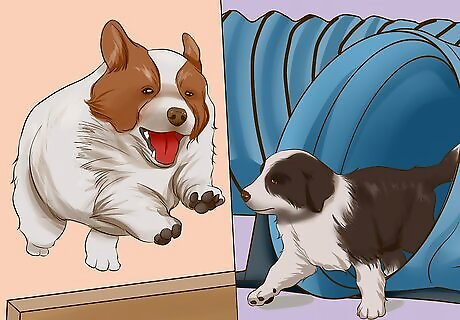
Go to an indoor agility class. Border Collies are known for their agility and athleticism. Border Collies are well suited to the agility sport and this is a great way to stimulate your puppy mentally and to provide the exercise that they need and crave. Enrolling your puppy in an indoor agility class, held by a local instructor or training center, will teach your puppy to follow your commands and give them an outlet to expend their energy. Agility can also become a lifelong pursuit for your Border Collie as they grow into adulthood. Many Border Collie owners who enroll their dogs in agility classes end up having their dogs compete in agility tournaments or events.
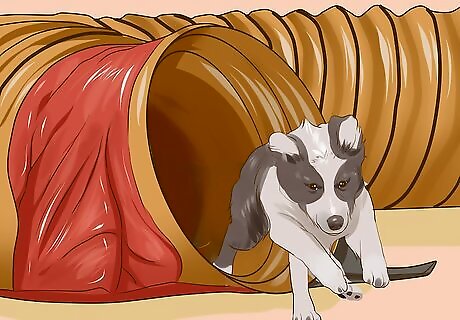
Take them to an indoor exercise space. Some pet stores, gyms, or training centers allow dogs to play and exercise at their indoor facilities. There are even dog fitness centers where trainers can help your dog learn new games and new commands. Since inclement weather can prevent outdoor activities, having an indoor space as a backup will ensure your puppy gets the activity that they need. You can also exercise your puppy indoors by playing ball games or by making an indoor obstacle course. You can make an indoor obstacle course by marking small hurdles or obstacles that your puppy will go around. Try putting a blanket over two chairs to make a tunnel for your puppy to go through or use a plastic hula hoop for your puppy to jump through.
Playing Games and Training
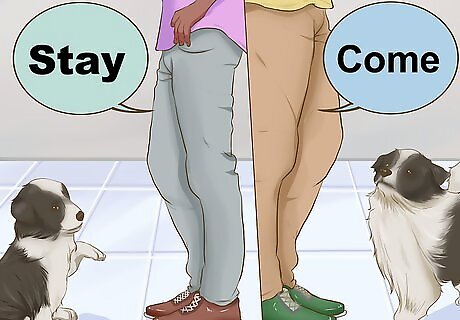
Provide opportunities for mental stimulation. An extremely intelligent breed, Border Collies need opportunities for mental stimulation to keep them occupied, engaged, and alert. Puppies need to be kept engaged with mental and physical exercise, or they can develop destructive behaviors. Border Collie puppies can easily become hyperactive, so finding time to mentally engage with them can curb these behaviors. Games that use your puppy's senses, like sight and smell, are good ways to mentally stimulate your puppy whether you're indoors or outdoors. Obedience training is a great way to mentally stimulate your puppy. They learn very quickly, and as working dogs, they are bred to be responsive to commands. Teach them basic obedience commands like sit, stay, and come before moving on to more advanced tricks.
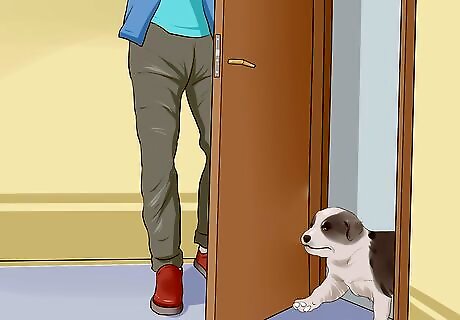
Play hide and seek. Your Border Collie puppy has a keen sense of smell and will enjoy games that involve seeking out food and toys, since this appeals to their instinct to find prey. You can play games indoor, or outdoors, by hiding a treat or piece of dog kibble and letting your puppy find it. This is also a good opportunity to practice commands like stay and come. You can also play hide and seek by hiding behind a door or piece of furniture and calling out your puppy's name. They'll try to find you and you can reward them with praise or a small treat whenever they successfully find you.
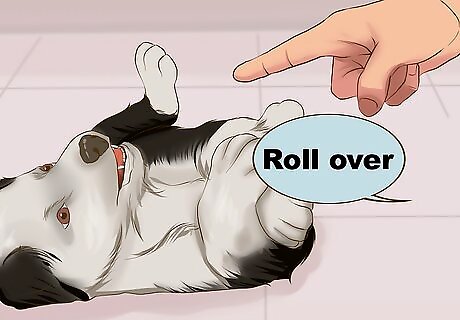
Teach them basic obedience commands. It is important to start training your new puppy early on. Border Collies are very intelligent and respond well to training, but can be headstrong and overly independent if they are not taught to respect their owners early on. Start using positive reinforcement to encourage good behaviors and to discourage negative behaviors, like nipping or digging. Obedience training is also a great way to mentally stimulate your puppy and to curb destructive habits. While young puppies, those four months old and younger, can learn basic commands like sit and stay, they may not be able to fully grasp more advanced commands, like any tricks to roll over, until they are older.
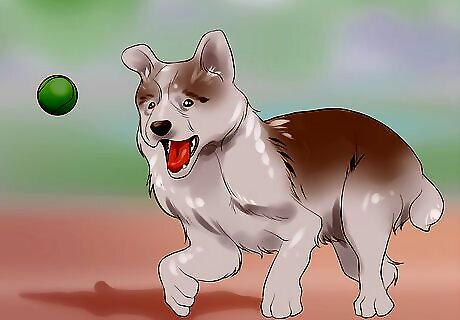
Play fetch. Border Collies love to fetch and can fetch a ball or toy for hours. You can play fetch either indoors or outdoors with your puppy, making it a great game to play no matter what the weather is. Teach your puppy to retrieve a ball or toy by using positive reinforcement, like offering a treat for a successful retrieval. You can enhance the fetch game by tossing the toy up or down stairs, which will give your puppy additional exercise. Use a white or light colored ball when you’re playing fetch outside, especially if the sun is setting, for visibility. Softer toys can be used for fetch indoors, since rubber balls could damage items in your home.
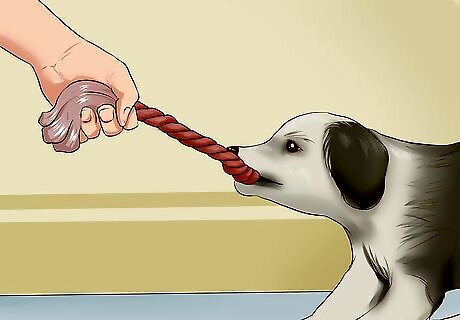
Play tug of war. Use a long sturdy rope toy to play tug of war with your puppy. Do not use articles of clothing for tug of war, especially socks or shoes. This can encourage negative behaviors, like chewing on clothing, as your puppy begins to associate chewing with a game. This game can also serve as a compliment to training. Use tug of war to practice the “let go” command, and reward your puppy with a small treat for successfully listening.

















Comments
0 comment